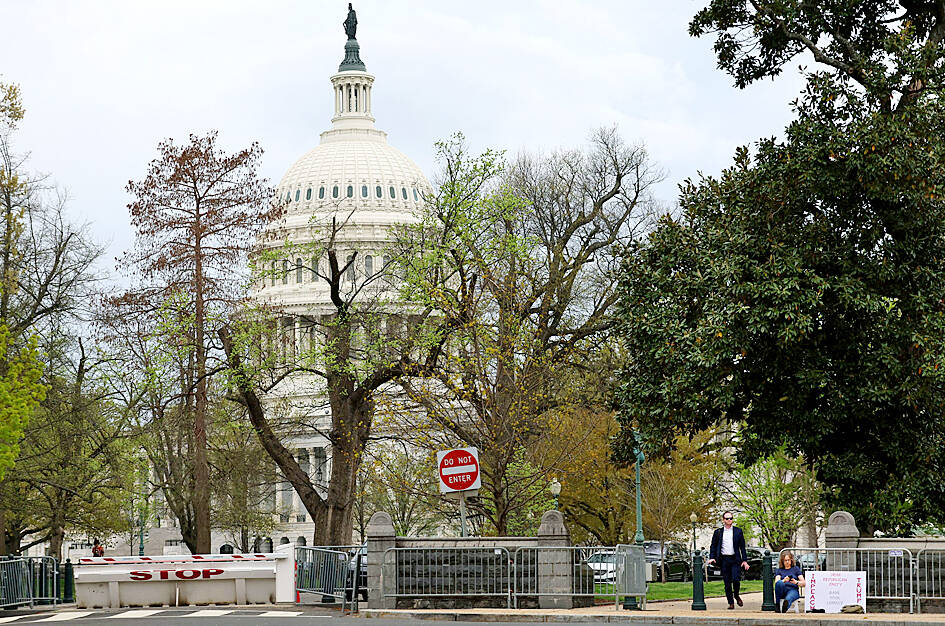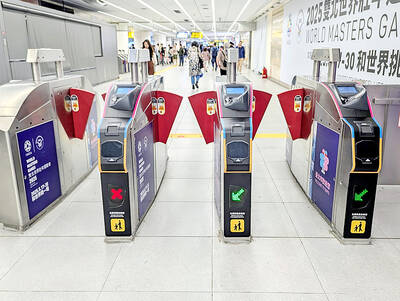The US House of Representatives was slated to vote on two bills related to Taiwan yesterday, aiming to lift restrictions on bilateral engagement and encourage the nation’s international participation.
The proposals would amend bills signed by US President Donald Trump in his first term, the Taiwan Assurance Act and the Taiwan Allies International Protection and Enhancement Initiative (TAIPEI) Act.
The Taiwan Assurance Act requires the US Department of State to conduct a review of Taiwan-US relations within 180 days of its passing and submit its findings to the Committee on Foreign Relations. The amendment, the Taiwan assurance implementation act, would turn that one-time report into a periodic review every two years, with the aim of eventually lifting self-imposed restrictions on engagement.

Photo: Reuters
In January 2021, then-US secretary of state Mike Pompeo lifted all restrictions on engagement between Taiwanese and US officials, although former US president Joe Biden reinstated some of them.
US Secretary of State Marco Rubio proposed several pro-Taiwan bills during his time as a senator, so people speculate that he would seek to lift current restrictions.
The TAIPEI Act stated that the US government must advocate for Taiwan’s membership in international organizations and encourage other countries to maintain diplomatic relations with Taiwan.
The amended bill, known as the Taiwan international solidarity act, would clarify the meaning of UN Resolution 2758 and authorize a report on China’s attempts to isolate Taiwan.
“The United States opposes any initiative that seeks to change Taiwan’s status without the consent of the people,” the bill says.
The bill also instructs US government representatives in international organizations to urge other countries to resist China’s attempts to “distort the decisions, language, policies or procedures of such organizations regarding Taiwan.”

A magnitude 6.4 earthquake struck off the coast of Hualien County in eastern Taiwan at 7pm yesterday, the Central Weather Administration (CWA) said. The epicenter of the temblor was at sea, about 69.9km south of Hualien County Hall, at a depth of 30.9km, it said. There were no immediate reports of damage resulting from the quake. The earthquake’s intensity, which gauges the actual effect of a temblor, was highest in Taitung County’s Changbin Township (長濱), where it measured 5 on Taiwan’s seven-tier intensity scale. The quake also measured an intensity of 4 in Hualien, Nantou, Chiayi, Yunlin, Changhua and Miaoli counties, as well as

Credit departments of farmers’ and fishers’ associations blocked a total of more than NT$180 million (US$6.01 million) from being lost to scams last year, National Police Agency (NPA) data showed. The Agricultural Finance Agency (AFA) said last week that staff of farmers’ and fishers’ associations’ credit departments are required to implement fraud prevention measures when they serve clients at the counter. They would ask clients about personal financial management activities whenever they suspect there might be a fraud situation, and would immediately report the incident to local authorities, which would send police officers to the site to help, it said. NPA data showed

ENERGY RESILIENCE: Although Alaska is open for investments, Taiwan is sourcing its gas from the Middle East, and the sea routes carry risks, Ho Cheng-hui said US government officials’ high-profile reception of a Taiwanese representative at the Alaska Sustainable Energy Conference indicated the emergence of an Indo-Pacific energy resilience alliance, an academic said. Presidential Office Secretary-General Pan Men-an (潘孟安) attended the conference in Alaska on Thursday last week at the invitation of the US government. Pan visited oil and gas facilities with senior US officials, including US Secretary of the Interior Doug Burgum, US Secretary of Energy Chris Wright, Alaska Governor Mike Dunleavy and US Senator Daniel Sullivan. Pan attending the conference on behalf of President William Lai (賴清德) shows a significant elevation in diplomatic representation,

The Taipei MRT is to begin accepting mobile payment services in the fall, Taipei Rapid Transit Corp said on Saturday. When the company finishes the installation of new payment units at ticketing gates in October, MRT passengers can use credit cards, Apple Pay, Google Pay and Samsung Pay, the operator said. In addition, the MRT would also provide QR payment codes — which would be compatible with Line Pay, Jkopay, iPass Money, PXPay Plus, EasyWallet, iCash Pay, Taiwan Pay and Taishin Pay — to access the railway system. Currently, passengers can access the Taipei MRT by buying a single-journey token or using EasyCard,